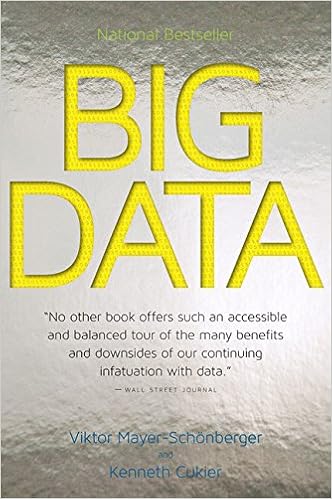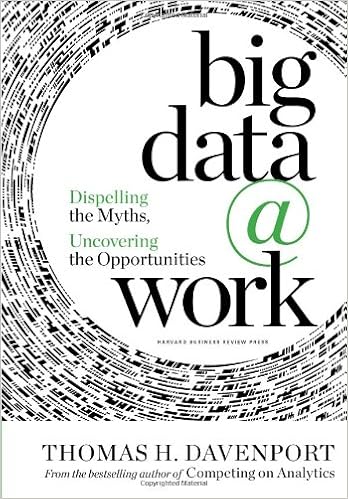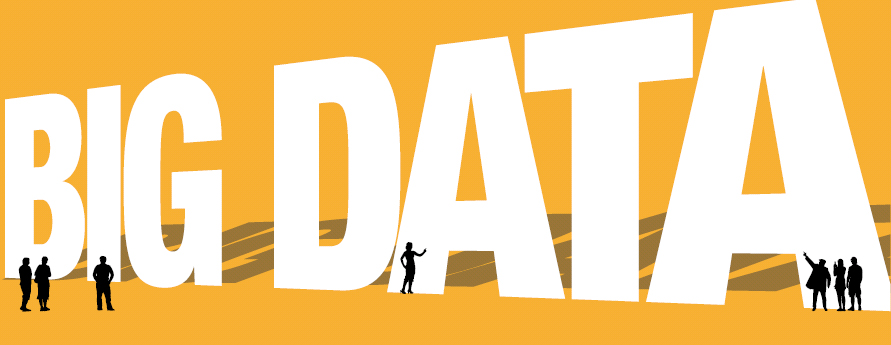THE BIG DATA BUSINESS
 Jane Griffin, Managing Director Analytics, Deloitte Canada and Americas— “Big Data at Work is the first and only book to describe how real organizations are using big data, extracting value from it, and combining it with other forms of data and analytics. It’s an invaluable guide to planning and action.” Jonathan D. Becher, Chief Marketing Officer, SAP— “Is Big Data a buzzword or does it have practical applications in business? Big Data at Work goes beyond tech-talk to help businesspeople turn Big Data into Big Decisions.” Gary L. Gottlieb, MD, MBA, President and CEO, Partners HealthCare System, Inc.; Professor of Psychiatry, Harvard Medical School— “Big Data at Work provides a terrific foundation for thoughtful planning to exploit the business opportunities created by diverse and vast sources of information. Davenport’s clear approach will enlighten managers about the need to carefully mine these resources to improve operations and products while driving new and competitive strategies.” Rob Bearden, CEO, Hortonworks— “Thomas Davenport has supplied a smart, practical book for anyone looking to unlock the opportunities—and avoid the pitfalls—of big data.” Adele K. Sweetwood, Vice President, Americas Marketing & Support, SAS— “Conversational, engaging, and an exceptional guide for decision making in the big data world. Big Data at Work offers insight to the business and technology components of a big data strategy, a path to success, and best practices from across industry sectors.” About the AuthorThomas H. Davenport is a world-renowned thought leader on business analytics and big data, translating important technological trends into new and revitalized management practices that demonstrate the value of analytics to all functions of an organization. He is the President’s Distinguished Professor of Information Technology and Management at Babson College, a fellow of the MIT Center for Digital Business, cofounder and Director of Research at the International Institute for Analytics, and a senior adviser to Deloitte Analytics. Davenport is the author or coauthor of seventeen books, including the bestselling Competing on Analytics, as well as the author of dozens of articles for Harvard Business Review. This book will help you understand: “It’s a required reading for managers that need a straightforward, hype-free introduction to big data, a clear and clarifying “signal” in the incredible noise around the confusing and mislabeled term.” — Forbes “Davenport has written a thought-provoking book about a current topic that is becoming more important to business and individuals every day. Summed up: Highly recommended.” — Choice magazine “The book covers all aspects of the issue, from what big data means, to whom you must hire, to what technologies to follow. It’s surprisingly easy to read, given the topic, and offers good examples to ponder from startups and large firm.” — Globe & Mail “Davenport is a methodologically-sound researcher. His deep interviews and surveys of executives and data scientists set a standard for excellence in an industry where marketing bravado generally supersedes scientific rigor” — Information Management • Why big data is important to you and your organization • What technology you need to manage it • How big data could change your job, your company, and your industry • How to hire, rent, or develop the kinds of people who make big data work • The key success factors in implementing any big data project • How big data is leading to a new approach to managing analytics  The reasons that validate the importance of Big Data The reasons that validate the importance of Big DataBig Data is independent of any field size or business, such as management and collection are carried out in all areas; Therefore, it makes easier to access. Let's get an overview of the reasons that validate the importance of big data in the enterprise: data an asset to the company: Every company that produces data, whether small or large.generate data and an appropriate strategy is required to store the data. The amount, of data, can be very large or less, but an appropriate strategy can help to manage the right way through the, collection use, and protection of, the company.  All activities All activities This indicates that companies believe that large amounts of data are not for them now his able importance to use and understand. Data collection market and better serve customers: customers and market trends are some important factors for the company to look for success. Each company manages the data to understand the whims of their customers tend to change over time. Therefore, may be useful applications to analyze large amounts of data for a better understanding of customer needs, job, and it would be the future purchase Improve the functioning and internal efficiency: companies should also focus on the data of their employees, including the optimization of the delivery, performance monitoring, and the recruitment of suitable candidates; that all can be carried out with large amounts of data. This can help to leave the internal efficiency of different services companies.Efficient financial market: financial transactions are also important for companies because it leads to economic growth, of the organization. Financial transactions between companies and customers can be handled using the analysis of large amounts of data because it the algorithms treated for purposes of the bill related  Business understanding optimizing business Business understanding optimizing business processes can now be carried out more easily. Retailers can maximize their actions on the basis of forecast data from the media. the supply chain and route of administration can now be optimized using this technique. The human resources department of organizations will benefit as hiring the right talent. It also measures the level of employee engagement with their tools. Therefore, the analysis of Big Data is not limited to specific fields numbered but broadened its horizons by services and self-quantification on a larger scale. If it is used properly, it can affect companies in an unexpected movement and be more and more opportunities for growth. Candidates who have used a great knowledge of the tools in the analysis of large data sets are in high demand. For they need knowledge about software that can help with this task. One of the best software that suits your needs is Hadoop and formal training, it can be very successful...  By the Company does not intend to be in it, must be thinking what is the importance of large enterprise data volumes and how it can help in the proper functioning of the company. Now, many people believe that large amounts of data are required in certain areas. However, this is just a myth; However, it is free of all boundaries and can help the operation within all companies. " Big Data has to benefit a great potential of all industry organizations worldwide. Big Data is much more than a lot of data and in particular the combination of different datasets provide organizations with real knowledge that can be used in decision making and to improve the financial situation of an organization. Before you know how big can help your organization's data, we will see what is really the big data: It is generally accepted that large data can be explained in terms of three V: speed, scope, and volume. However, I would add a few more V, to better explain the implications and the impact of a well-thought of big data strategy. speed The speed is the speed, with the generated data is stored, analyzed and displayed. In the past, when the amount was a common practice, it was normal to get every night every week an update of the database, or even. Computers require time to process the databases and updates. In large age data, the data in real-time or near real-time to create. With the availability of an Internet connection with a cable or wirelessly, the machines can transmit data when it is created devices. The speed at which data is created is now almost unimaginable: Every minute climb to 100 hours of video on YouTube. In addition, more than 200 million emails every minute, about 20 million views and 30,000 photos will be sent uploaded to Flickr pages nearly 300,000 tweets sent and are nearly 2.5 million visits to Google. Challenge organizations face enormous speed data in real time to create and use. diversity In the past, all the data was created, structured data was fit well in columns and rows, but those days are gone. Today 90% of the data generated by the organization of unstructured data. Today there are data in many different formats: structured data, semi-structured data, unstructured data and complex structured data. The wide variety of data requires a different approach and different techniques to store all raw data. There are many different data types, and each of these types of information require, different types of scans or different tools to be used. Social media like Facebook posts or tweets can give different views, such as sentiment analysis of your brand, while the sensory data about how a product is made available is used and what the error is. volume 90% of all data ever created, was in the last two years. From now on, the data amount is doubled in the world every two years. In 2020, we have 50 times as much data as we in 2011. The amount of data is huge and an important factor for the digital universe constantly objects with sensors in all data globally expanding Internet had to create every other device.  If you look at the approximately 2.5 million terabytes of data generated plans annually by sensors installed on the engines. agribusiness also generates large amounts of data, installed on tractors sensors. John Deere used, for example, to check the data from the sensors to optimize the machine, to monitor the growing fleet of agricultural machinery and help to make farmers better decisions. Shell operates with ultra-sensitive sensors to find more sources of oil and when these sensors are installed in 10,000 wells to collect data about 10 exabytes annually. This is nothing new compared to the Square Kilometre Array telescope will generate an Exabyte of data per day. In the past, a lot of data has to provide, it would cause serious problems. Today, to produce with reduced storage costs, better storage options that Hadoop and algorithms a sense of all this data, there is no problem. truthfulness, a lot of data on a variety of high-speed input volumes worthless if the data is incorrect. Incorrect information can cause many problems for businesses and consumers. Therefore, companies need to ensure that the data is correct, and the analysis of the data is correct. Especially in automated decision-making, where the human eye is involved, you must be sure that the data and analysis are correct. If you want to be your organization's information-centric, to be able to trust the data and analysis. Surprisingly trust 1-3 entrepreneurs, not the information in the decision used. So if you want to develop a strategy of large amounts of data, which should focus heavily on data accuracy and precision of analysis. variability Big Data is highly variable. Brian Hopkins, principal analyst at Forrester defines variability as the "direction of variation in the lexicon". It refers won the Watson supercomputer Jeopardy. The supercomputer would "dissect an answer in its meaning and to know what was the right question." It is very difficult because words have different meanings as a whole depends on the context. For the answer, Watson had to understand the relationship. Variability is often confused with the variety. Say you a bakery that sells 10 different types of bread. This is the variety. Now imagine 3 days before going directly to the bakery and the same type of bread to buy every day, but every day it tastes and smells different. So is the variability. Variability is therefore very important in the analysis of sentiment by. Variability means that the direction (fast) changing. (Almost) the same tweets a word may have an entirely different meaning. To run a specific meaning analysis algorithms, they must be able to understand the context and to, decipher, able, the exact meaning of the word in this context. This is still very difficult. display, This is the hardest part of the large amounts of data. Do everything you can, of course, a lot of data in a way that is easy to understand and to read. With good raw data, screens can be used. Golf visualizations do not mean ordinary graphs or pie charts. Average complex graphics containing many variable data while understandable and readable. The screen may not be the most difficult part technology; it most difficult. Tell a complex story in a chart is very difficult, but also extremely important.
All Categories
Home & Family
880
Entertainment
223
Technology
635
Business
4847
Society & News
1412
Health & Medical
2882
Gaming
246
Womens Interests
110
Relationships
146
Spirituality
54
Finance
423
Marketing
3279
Others
673
Legal
149
Internet & eBusiness
3776
Affiliate Marketing
1551
Music
35
Languages
28
|